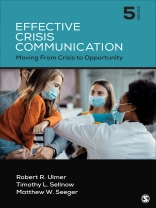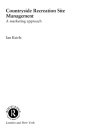In this fully updated Fifth Edition, three of today’s most respected crisis/risk communication scholars provide the latest theory, practice, and innovative approaches for handling crisis. This acclaimed book presents the discourse of renewal as a theory to manage crises effectively. The book provides in-depth case studies that highlight successes and failures in dealing with core issues of crisis leadership, managing uncertainty, communicating effectively, understanding risk, promoting communication ethics, enabling organizational learning, and producing renewing responses to crisis. Unlike other crisis communication texts, this book answers the question, ‘What now?’ and explains how organizations can and should emerge from crisis. Authors Robert R. Ulmer, Timothy L. Sellnow, and Matthew W. Seeger provide guidelines for taking the many challenges that crises present and turning those challenges into opportunities for overcoming a crisis.
Jadual kandungan
Part I • The Conceptual Foundation
Chapter 1•Defining Crisis Communication
Chapter 2•Understanding Crisis Communication Theory and Practice
Part II•The Lessons and Practical Application
Chapter 3•Lessons on Effective Crisis Communication
Chapter 4•Applying the Lessons to Produce Effective Crisis Communication
Chapter 5•Lessons on Managing Crisis Uncertainty Effectively
Chapter 6•Applying the Lessons for Managing Crisis Uncertainty Effectively
Chapter 7•Lessons on Effective Crisis Leadership
Chapter 8•Applying the Lessons for Developing Effective Crisis Leadership
Part III•The Opportunities
Chapter 9•Learning Through Failure
Chapter 10•Risk Communication
Chapter 11•Responding to the Ethical Demands of Crisis
Chapter 12•Facilitating Renewal Through Effective Crisis Communication
Mengenai Pengarang
Matthew W. Seeger is currently professor of communication and co-director of the Center for Emerging Infectious Diseases at Wayne State University. Dr. Seeger’s research concerns crisis and risk communication, health promotion and communication, crisis response and agency coordination, the role of media—including new media—crisis and communication ethics, failure of complex systems, and post-crisis resilience and renewal. He has worked with the U.S. Centers for Disease Control and Prevention for more than a decade. He is a member of the World Health Organization Guidelines Development Group for Emergency Risk Communication. He has consulted with several Fortune 500 firms on crisis management planning and response. His work has been supported by the CDC, NCFPD, NSF, NIH, and the State of Michigan, with over $7 million in extramural funding. His work on crisis, risk, and communication has appeared in more than 100 peer reviewed articles and book chapters including the Handbook of Crisis and Risk Communication, International Encyclopedia of Communication, Journal of Health Communication Research, Health Promotion Practice, Communication Monographs, International Journal of Crisis and Contingency Management, Communication Yearbook, the Handbook of Public Relations, Handbook of Applied Communication Research, Communication Monographs, Public Relations Review, Communication Studies, Journal of Business Ethics, Journal of Business Communication, Management Communication Quarterly, Journal of Applied Communication Research, and the Journal of Organizational Change Management, among several others. Seeger is the author or coauthor of eight books, most focusing on crisis and risk communication, including Communication and Organizational Crisis (2003), Crisis Communication and the Public Health (2008), Effective Crisis Communication (2007), Effective Risk Communication (2009), Theorizing Crisis Communication (2021), Crisis and Emergency Risk Communication (Second Edition, 2015), Narratives of Crisis: Stories of Ruin and Renewal (2016), and the International Handbook of Crisis Communication (2016). He has advised over 40 doctoral dissertations.












